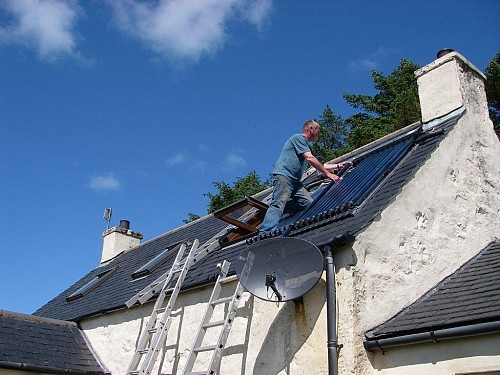Solar Water Heaters Earn You Tax Credits Till December 2021
 Solar water heaters provide an inexpensive and environmentally friendly way to heat the water used in your home. Throughout most of the United States, the sun shines at some point in the day. In some other states though, the sun hardly shines which is why many solar water heaters are made with backup heating systems or are used together with conventional water heater tanks.
Solar water heaters provide an inexpensive and environmentally friendly way to heat the water used in your home. Throughout most of the United States, the sun shines at some point in the day. In some other states though, the sun hardly shines which is why many solar water heaters are made with backup heating systems or are used together with conventional water heater tanks.
Solar water heaters and solar roof shingles are becoming more popular with the support of the U.S. government and the tax credit incentives offered to home owners who purchase solar water heaters. Solar water heater tax credits are available through December 31, 2021.
Now is a great time to start learning more about this alternative energy source and how the sun can work for you to save money and save energy. Imagine how much cleaner our air would be and how much money people would save if just a few homeowners in every city in the U.S. installed a solar water heater. The savings – energy and financial – would be tremendous.
How a Solar Water Heater Works
Solar water heaters comprise 2 parts: The storage tank and collector, and the heating system.
- Storage Tanks and Collectors
Tanks can be either a one-tank or a two-tank system. With a one-tank system, a back up heater is part of the tank, while in a two-tank system, the water is preheated before it enters a conventional water heating system.
There are 3 types of storage tanks and collectors:
1. Integrated Collector-Storage (ICS) Systems: This collector type is also known as a batch collector. Water is heated in dark tanks or tubes within an insulated box. The water is heated in the insulated box until it needs to be used. This system is not recommended for cold climates.
2. Flat Plate Collectors: Flat Plate Collectors consists of copper tubes that are fitted to flat absorber plates. The flat plate assembly is contained within an insulated box and covered with glass. This collector type can typically hold 40 gallons of water.
3. Evacuated Tube Collectors: This collector is pictured above and is the most efficient of the three collectors. There is some tube replacement maintenance associated with this collector type but it is best as it can work in below freezing temperatures.
- The Heating System or Circulation System
There are two types of Active Circulation Systems, meaning they use pumps and controls:
1. Indirect or Closed Loop: This system is best for colder climates in that a pump circulates a non-freezing liquid which transfers the heat through the collectors and heat exchanger thus heating the water that flows into the home.
2. Direct Circulation Systems: Direct circulation systems use pumps to circulate household water through the collectors and then into the home. They work well in warmer climates.
There are two types of Passive solar water heating systems – these systems are more reliable and last longer but are not as efficient as active systems.
1. Integral Collector-Storage Passive Systems: These work best in locales that rarely experience freezing temperatures. They are suitable for households which need large amounts of hot water during the day and evening.
2. Thermosyphon Systems: These systems should be installed with the collector at a lower level than the storage tank. This ensures that the warmed water will rise into the tank, as the existing, cooler water sinks. Although generally quite reliable, they include a heavy tank; your contractor must ensure that your roof is sturdy enough for the weight. This kind of system tends to be pricier.
(source: energysavers.gov)
Solar Water Heater Costs
An active, flat plate solar collector system will cost approximately $2,500 to $3,500 installed and produce about 80 to 100 gallons of hot water per day. A passive system will cost about $1,000 to $2,000 installed but will have a lower capacity.
(source: toolbase.org).
Keep in mind that tax credits for solar water heaters will help offset the initial cost of purchase for the heater. You should also check with your local government and utility company to see if there are additional tax credits or incentives available. The operational costs of solar water heaters will in just a short time reflect the savings over conventional water heating methods.
Updated March 22, 2018.
Looking for a Pro? Call us (866) 441-6648

Plumbing Average Costs
Plumbers Experiences

Parking Lot Lights Restored So Employees Can Reach Cars Safely

Kitchen Faucet Replacement With A Unique New Feature



